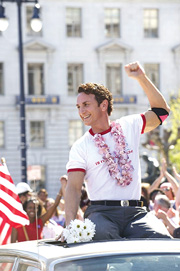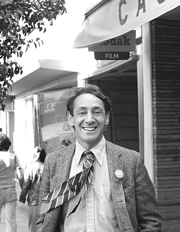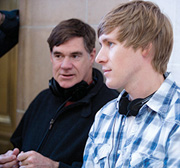Milk, Spilled
Screenwriter Dustin Lance Black goes behind the scenes of the new movie about the late, great Harvey Milk.
By Larry Nichols

Harvey Milk, one of the pivotal figures in the gay-rights movement, now has his brilliant-but-too-short life and career depicted on the big screen.
Milk was the first openly gay man elected to public office when he became a city supervisor in San Francisco in 1978. The city’s gay-rights ordinance, passed that year, was among his many achievements. (Though Milk was the first out gay man elected, he was not the first openly gay elected official:
Kathy Kozachenko won a seat on Ann Arbor’s City Council in January 1974, and, later that year, ElaineNoble was elected to the Massachusetts House of Representatives.)
Less than a year after he was elected, Milk, along with Mayor George Moscone, was assassinated by former city supervisor Dan White.
Milk was written by out screenwriter and executive producer Dustin Lance Black, directed by Gus Van Sant, and stars Academy Award-winning actor Sean Penn in the title role.
Black, who had wanted to make this movie for a long time, studied Milk’s life a great deal before starting to pen the script.
“There were three years of research traveling to San Francisco from Los Angeles, meeting the real-life people and doing those interviews before there was a script,” he says. “The research didn’t stop then. We started producing the film and, as a producer on it, we had to get even more exacting on what things looked like and where things took place. We were researching all through post-production.”
Milk represents a huge leap in Black’s profile as a screenwriter. Born in 1979, he grew up in a devout Mormon military household in San Antonio. After relocating to Salinas, California, he finished high school and became deeply immersed in theater, apprenticing with stage directors, working on lighting crews, and acting. He graduated from UCLA’s School of Theater, Film and Television with honors.

Black soon began directing documentaries, commercials, and music videos. His documentary features led to two years of producing and directing the hit BBC reality series Faking It.
In 2004, he was drafted for the television series Big Love as a writer and producer, working with the program for three seasons. He also wrote and directed Pedro, profiling the late AIDS activist and reality TV star Pedro Zamora, which premiered at the 2008 Toronto International Film Festival.
“I prefer to be involved in projects where I have a personal connection to whatever the story is and the characters are,” Black says of his film work. “Because then I can write about my experience and get specific enough that I’m telling a story that people find original and compelling. That would explain Big Love. I grew up Mormon, so I was able to help them with those stories. Obviously, Milk and Pedro had to do with growing up gay. So it has some relation to my own biography, I suppose.”
Once Gus Van Sant (Good Will Hunting, My Own Private Idaho) signed on to direct Milk, Black saw the project gain momentum and found that the two of them saw virtually eye to eye on their vision of the film and the casting.
“I’m also one of the executive producers of the film, so I was there every step of the way,” he says. “Ultimately, the decision is Gus’, but I can’t think of a single instance where we disagreed. It was very often clear who it should be. We went and met Sean [Penn] together. We both thought that Sean was the perfect person to bring Harvey to life.
“I sat through all the casting sessions with Gus. Pretty much, we knew it when we saw it. [Van Sant] knows the story so well, too, because he had been wanting to make it forever. So we both had a strong sense of who these people were in real life, and I think it was important to him that these people were portrayed as accurately as possible.
“Sean Penn came in the room and nailed it,” Black continues. “It happened every single time with every role. Even in the supporting roles. Alison Pill playing Anne Kronenberg—some of the people really embodied these characters. Obviously, Emile Hirsch as Cleve Jones . . . it is really shocking how exact his performance was. We would have the real Cleve on the set, and Emile would start walking and talking in character and it was pretty amazing. You would watch the real Cleve Jones start giggling like a schoolgirl, because he saw himself transported back to 1976.”
If the trailers for the movie are any indication, Milk does a fantastic job of transporting the audience back to 1970s-era San Francisco, where Milk eventually settled after leaving New York City.

“The movie starts in the early 1970s, right as Harvey is moving to San Francisco,” Black says. “He’s already an adult and lived through quite a bit of his life at that point. The story goes through to his assassination. So the idea was always to tell the story of Harvey Milk. It’s a very personal biopic portraying his San Francisco years. Because the goal was to make it an intimate portrait, hopefully you find out a lot about who the man was before he moved to San Francisco.”
Black says that a lot of inspiration and the visual aesthetic for the film was drawn from the 1984 documentary The Times of Harvey Milk, which went on to win an Academy Award.
“It is one of the things that I saw out of many in my bibliography of research,” Black says. “There were about 2,300 sources. It was probably the third thing I saw or heard about Harvey, the first being first-hand stories from some of the folks I was working with in the theater world. Rob Epstein, one of the filmmakers, was incredibly helpful once we started making the movie, because there is archival footage from the film. Some of it we did source from The Times of Harvey Milk. Others, Rob was very helpful in finding stuff that wasn’t in The Times of Harvey Milk. But certainly that movie helped to set the stage so that enough people knew the story of Harvey Milk and we could get out there a pitch about Harvey.”
The archival footage turned out to also have a profound effect on casting: in particular, a conservative figurehead should best be left to portray herself.
“That idea started with the inclusion of Anita Bryant in the movie,” Black says. “I was concerned as a writer that even if we quoted her directly in the film, the things she said and the way she said them were so outrageous to today’s audience that I feared people would think we were caricaturing her and that there was no way someone could have said the things she said and meant. Early on, Gus and I discussed using the real footage of Anita and letting Anita play herself, because in that way, you never question it and we are letting her speak for herself. That philosophy sort of blossomed. Gus sort of ran with it and decided to include more archival footage in the film.”
Black’s hope is that mainstream audiences will see the parallels between the political struggles for gay civil rights in 1970s-era California and the struggle for gay equality around the country today.
“It’s amazing to see, especially in California, right now the gay community is fighting Proposition 8, which would write into the constitution what the gay community sees as bigotry,” Black says. “The state Supreme Court said that gay marriages must be allowed and recognized. Proposition 8 would rewrite the constitution saying that it’s illegal. So a big portion of this movie is about California exactly 30 years ago this November and the gay community fighting Proposition 6, which would have made it illegal to be gay and teach or work in a public school. For Californians, it’s almost literally reminiscent.”
Black adds that some might see another parallel between Bryant and another former beauty queen-turned-outspoken antigay right-wing mouthpiece.
“I had a few friends call me up and say, ‘Wow, it’s so amazing to see Palin running as vice president, because she’s beautiful, an ex-beauty queen, a mother, well-spoken, and there is something about her that is so reminiscent of Anita Bryant exactly 30 years ago,’” he says. “I think some people will pick up on that. I also think the gay community has made progress in the last 30 years. The pendulum has swung back in certain cases, but I think kids who are born gay and lesbian today are still receiving a message that they are less than heterosexual children and they have less rights. I still think they remain in crisis and are abused, if not physically then verbally. The National Gay and Lesbian Task Force reported that 26 percent of gay and lesbian youth that come out to their families are told to leave home. That message is still out there, that they are ‘less than.’ I think that was always Harvey’s fight: to let the kids out there in these small towns know that they are equal to heterosexual youth and that they can do wonderful great things. So in that way, Harvey’s message is still needed and important.”
Milk may have a Hollywood budget and all of the commercial expectations that come with it, but Black is more concerned about the cultural impact of the film than how many tickets it moves at the box office.
“I’m excited about it right now, about the fact that it is getting so much attention in a mainstream way,” he says. “It’s really a credit to Harvey. Thirty-five years ago, he didn’t win political power in San Francisco by just courting the gay community. He got the really straight community: he got the union guys, the teamsters, the firemen, the teachers, the seniors, the Chinese vote, the Latin vote, and he was able to cross over into a wider audience and a very unexpected audience. To me, it’s a testament to the film that it is already starting to cross over in that way. Sean is very masterful in bringing Harvey back to life on the screen, and I think straight people are not going to be able to resist him. He’s very charming. I’m hopeful that there is this anticipation for a film with this message.”
Black says that he expects gay audiences, especially the ones keeping a watchful eye on historical narrative, to be just as charmed with the movie that he helped craft.
“I think the people in the Castro will look at it with a critical eye,” he says. “I hope they do. We worked very hard to be very, very accurate. I hope they are surprised at how well we did. I think the far right, who aren’t supportive of the gay movement, are going to look at it with a real critical eye. But I hope they find something universal in it.”
Milk opens November 26 at Landmark’s River Oaks Theatre. For more information, visit www.milkthemovie.com.
Larry Nichols is a Philadelphia area-based writer and comedian.











Comments